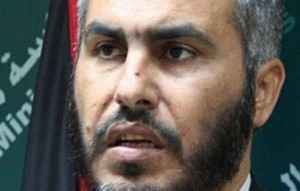The newspaper explained on Sunday that, starting in 2006, Baskin and Hamad sponsored an informal back channel between Israeli officials and Hamas officials, even as each side refused to deal with the other directly.
Who are Baskin and Hamad?
According to the newspaper, Baskin was born in 1956 to a Jewish family in New York. He studied Middle Eastern politics and history at New York University before immigrating to Israel in 1978.
After arriving in Israel, Baskin worked as a community organizer in an Arab village. He then began his career promoting Arab-Jewish relations, running a research group that promoted solutions to the Israeli-Palestinian conflict, and sometimes serving as an official mediator.
Born in 1964 in southern Gaza, Hamad trained as a veterinarian in Sudan before joining Hamas in 1987, the year the movement was founded, according to an interview with Mr. Hamad published by Baskin in his book “The Negotiator.”
In 1989, Hamad was arrested for his activity in Hamas and spent five years in an Israeli prison. There he met Israelis for the first time, learned Hebrew and English, and became a spokesman for the inmates in their dealings with the prison authorities.After his release, Hamad wrote and edited several Hamas-run newspapers, gaining a reputation as a moderate who encouraged Palestinian self-reflection and sometimes criticized Palestinian violence.
The two men’s relationship began after their first phone call in July 2006 during the negotiation of the deal for Shalit, the captured Israeli soldier, who was released in October 2011, in exchange for the release of more than 1,000 Palestinian prisoners.
What is the cause of the dispute?
According to the newspaper, the two men’s relationship has survived countless rounds of violence between Israel and Hamas, and helped end many of them.
Even after October 7, when Hamas raided Israel, killing an estimated 1,200 people and kidnapping nearly 240 others, according to Israeli officials, Baskin and Hamad remained in contact, including discussing a deal to release some hostages.
As Israeli warplanes bombed the Hamas-controlled Gaza Strip, killing more than 13,000 Gazans according to Gaza health authorities, the unlikely relationship between them continued, and then something snapped, according to the newspaper.
She noted that the impact of the Hamas-led attack shattered the idea that the Israeli-Palestinian conflict could be contained forever without a solution. Since then, the conflict has displaced more than 1.5 million people, most of them in Gaza, and put the Middle East on the brink of regional war.
Among the consequences was also a dispute between Baskin Hamad, according to the newspaper.
It reported that, on October 24, Hamad began publicly justifying the Hamas attack and calling for further attacks, stating that “it is the presence of Israel that is causing all this pain, blood and tears.” He said in a television interview: “It is Israel, not us,” adding: “Everything we do is justified.”
A week later, Baskin watched the interview in horror, according to what the newspaper reported, which explained that the Israeli activist wrote in a text message to Hamad that was reviewed by the New York Times: “I think you have lost your mind and lost your moral code.” “I don’t want to talk to you again,” Baskin added.
Throughout their relationship, reaching a long-term truce, if not permanent peace, between Israel and Hamas seemed plausible, as it was an idea on the table that the two discussed personally, but not anymore.
The newspaper reported that, on October 24, Hamad, who was once considered a moderate in Hamas and spoke Hebrew in negotiations with Baskin, said he wanted to annihilate Israel. Baskin, a leftist, joined the Israeli mainstream in calling for the removal of Hamas.
“In my opinion, they can no longer exist as a government alongside Israel,” Baskin said in an interview.
“Baskin’s position has changed,” Hamad said in a separate interview. Hamad added: “He felt how I had changed.”
Hamad’s attack on Israel was highlighted in his recent statements. On November 8, he said to Al Jazeera news channel that he “challenges Israel if it is able, up to this moment, to record its achievement of any military achievement on the ground other than killing civilians.” He added that Gaza “is invincible and will remain a thorn in the throat of the Americans.” And the Zionists,” according to Reuters.
He continued, “The Americans support the occupying state under the great illusion that they can rearrange the situation in Gaza,” according to Agence France-Presse.
He stressed that “arranging the situation in Gaza is a purely Palestinian matter, and Hamas will be a part of it against their will, given that it is part of the Palestinian national fabric.”
In response to what was reported about the readiness of the Palestinian National Authority, headed by President Mahmoud Abbas, to administer the Gaza Strip after the end of the war, Hamad said, “I say to the Palestinian Authority clearly, you must not cooperate with the Americans, you must not come on the back of the American tank, and you must not cooperate with the American plan.”
He continued, “I address President Abu Mazen: This is a position that you will take credit for in history, to reject this suspicious, criminal position undertaken by the United States.”
On October 28, Hamad called for the immediate implementation of the United Nations General Assembly’s decision to allow humanitarian aid into Gaza, warning of a disaster after Israel expanded its air and ground attacks overnight, according to Reuters.
Hamad said in a press conference in Beirut, “We consider the decision a victory for our Palestinian people, and we demand that this aid piled up on the Egyptian side be quickly sent and distributed to all regions and hospitals in the Gaza Strip.”
Click here to read the PDF of the article in Arabic
Originally Published by Al Hurra at



